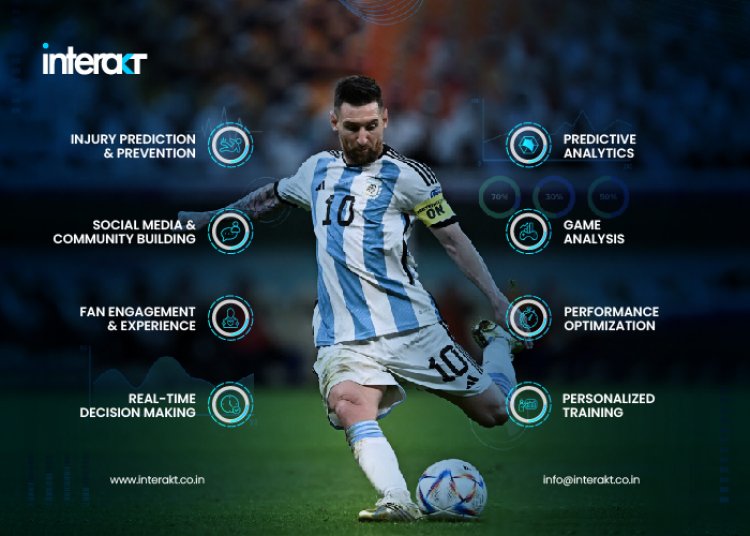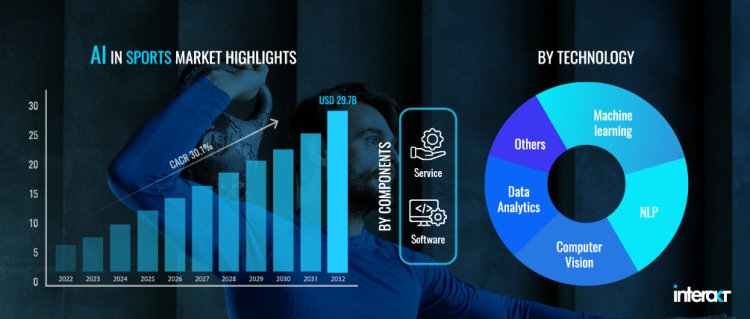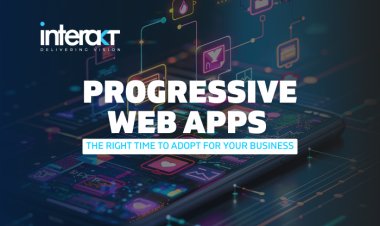AI Impact on Sports Industry
In recent years, artificial intelligence (AI) has made significant strides, transforming various sectors, including sports. The integration of AI in sports is revolutionizing the industry, enhancing training, performance analysis, fan experiences, and much more. This blog post provides an overview of AI's current state in the sports industry and delves into nine practical, real-life applications that showcase its transformative power.

AI is becoming a cornerstone of the sports industry, with predictions estimating that its market value will reach $19.2 billion by 2030. Its ability to analyze vast amounts of data, identify patterns, and make informed decisions is revolutionizing how sports teams operate.
One notable application is in data analysis. AI can sift through extensive datasets to uncover trends that can enhance player performance, inform strategic decisions, and deepen our understanding of the game. Moreover, AI-driven virtual reality (VR) environments are being utilized for training and player development. Prominent leagues like the NFL, MLB, and NBA are already leveraging AI to improve player performance, scout talent, and optimize game strategies.
The benefits of AI in sports are manifold. It saves time and money, enhances performance, and democratizes access to advanced tools, allowing smaller teams to compete more effectively. As AI technology continues to evolve, its applications in sports will only expand, opening up new and innovative possibilities.

AI Applications and Use Cases in Sports
Now, let's explore some of the most impactful applications of AI in the sports industry.
- Advanced Player Performance Predictive Models: AI-powered predictive modeling is transforming sports analytics by forecasting player performance with remarkable accuracy. By analyzing historical data, such as player stats, injury history, and disciplinary records, AI can predict the likelihood of injuries, performance slumps, and breakout seasons. This enables coaches and managers to make proactive decisions about player rotations and game strategies, enhancing team performance and reducing the risk of injuries.
- Game Footage Analysis: AI's ability to analyze game footage offers a competitive edge by identifying subtle patterns and trends. Machine learning algorithms meticulously track player movements and game dynamics, providing insights that can inform strategic decisions. This technology also serves as a performance evaluation tool, helping teams identify top performers and areas for improvement, ultimately leading to better game outcomes.
- Personalized Training Programs: AI is revolutionizing athletic training by creating personalized training regimes tailored to individual athletes' needs. Real-time monitoring capabilities track progress and provide precise feedback, allowing for adjustments that enhance performance and reduce injury risk. This personalized approach helps athletes optimize their training, ensuring they are in peak condition for competition.
- Innovative Sports Equipment: AI is driving innovation in sports equipment, leading to the development of advanced, performance-enhancing gear. For example, Adidas has introduced an AI-powered soccer ball that adjusts its flight path for optimal accuracy, while Wilson has created a tennis racket that enhances power and precision. These advancements, along with AI-enabled golf clubs and running shoes, are setting new standards for athletic performance and training.
- Enhanced Fan Experiences: AI is transforming how fans experience sports by offering personalized and immersive interactions. Teams like the Golden State Warriors and Los Angeles Dodgers use AI to create virtual reality experiences and assist with stadium navigation. AI also curates personalized content, facilitates player interaction through chatbots, and optimizes stadium traffic flow, creating a more enjoyable and engaging experience for fans.
- Injury Prevention and Player Safety: AI is playing a crucial role in preventing injuries and enhancing player safety. Teams like the Chicago Cubs and Cleveland Indians use AI to monitor player fatigue and sleep patterns, identifying those at risk of injury. The NFL is developing AI systems to detect concussions, while the Seattle Seahawks use machine learning to assess injury risks, helping to prioritize player safety and maintain team performance.
- Improved Officiating: AI is revolutionizing sports officiating by enhancing accuracy and fairness. The NBA uses AI to call fouls more accurately, MLB employs AI for tracking ball and strike locations, and the NHL uses AI to verify goals. These applications eliminate human error and bias, ensuring more precise and fair outcomes, benefiting players, teams, and fans alike.
- AI in Sports Advertising:AI is revolutionizing sports advertising by analyzing viewer preferences and placing ads strategically. This personalized approach ensures relevant ads during high-excitement moments, enhancing effectiveness and viewer engagement. AI's ability to gauge emotions and pick optimal ad times is transforming the advertising landscape in sports.
- AI in Sports Journalism: AI is streamlining sports journalism by automating reporting processes and enhancing event coverage. Natural language processing (NLP) technologies transform game data into compelling narratives, allowing for consistent and detailed coverage without extensive human presence. AI's integration in sports journalism keeps fans informed and reduces logistical demands.
Challenges in AI Sports
While AI offers numerous benefits to the sports industry, it also presents several challenges that must be addressed to maximize its potential.
- Data Privacy and Security: The collection and use of vast amounts of data in sports raise significant privacy and security concerns. Ensuring that sensitive information, such as player health data and fan preferences, is protected against unauthorized access is paramount. Implementing robust data encryption, access controls, and compliance with privacy regulations is essential to maintaining trust and security.
- Ethical Considerations: AI in sports also brings about ethical considerations. Issues such as bias in AI algorithms, the potential for reduced human judgment, and the ethical use of AI for monitoring and analyzing players must be addressed. Ensuring transparency, accountability, and fairness in AI systems is crucial to maintaining ethical standards in sports.
- Technological Reliability and Accuracy: The accuracy and reliability of AI systems are critical for their effective use in sports. Ensuring that AI algorithms and models are robust, validated, and free from errors is essential to prevent incorrect predictions, misinterpretations, and technical failures during critical moments.
- Cost and Accessibility:The development, implementation, and maintenance of AI systems can be costly, potentially limiting their accessibility to smaller teams and organizations with limited budgets. Finding ways to make AI technology more affordable and accessible is necessary to ensure widespread adoption and benefit across the sports industry.
- Regulatory Compliance:As AI becomes more integrated into sports, ensuring compliance with relevant regulations and standards is crucial. This includes adhering to data protection laws, advertising standards, and industry-specific regulations to prevent legal and reputational risks.
- User Adoption and Training: Encouraging user adoption of AI technology and providing adequate training is essential for maximizing its benefits. Athletes, coaches, officials, and other stakeholders must be educated on the use of AI systems, their potential benefits, and how to effectively integrate them into their workflows.
AI is poised to shape the future of the sports industry in numerous ways:
- Predictive Analytics: AI and Big Data are advancing predictive analytics, enabling precise game outcome predictions, injury forecasts, and performance insights.
- Virtual and Augmented Reality: VR and AR, powered by AI, are set to revolutionize training and spectatorship, offering immersive environments and enriched viewing experiences.
- Player Recruitment and Scouting: AI will streamline player scouting and recruitment, analyzing vast datasets to identify promising talent efficiently.
- Ethical and Regulatory Challenges: The integration of AI raises ethical and regulatory questions, including data privacy and sports betting regulation, which the industry must address.
- Innovation in Sports Equipment: AI will continue to drive advancements in "smart" sports gear, enhancing tracking, performance, and technique.The sports industry's future, underpinned by AI, promises to be dynamic and innovative. However, careful navigation is required to maximize benefits while addressing potential challenges and ethical considerations.
AI is not just transforming how sports are played and officiated; it's reshaping the entire industry. These advancements lead to better player safety, more accurate calls, and more efficient strategies. As AI continues to evolve, its impact on the sports world will only deepen.
If you're interested in building AI-enabled solutions for your business, get in touch with Interakt. Let us help you harness the power of AI to revolutionize your operations and stay ahead in the game.












